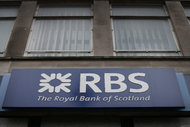 Peter Macdiarmid/Getty ImagesJapanese authorities are seeking to punish Royal Bank of Scotland over its role in manipulating benchmark rates.
Peter Macdiarmid/Getty ImagesJapanese authorities are seeking to punish Royal Bank of Scotland over its role in manipulating benchmark rates.
LONDON – A senior executive at the Royal Bank of Scotland’s Japanese investment banking unit is expected to resign in the wake of a rate-rigging scandal, according to a person with direct knowledge of the matter.
Ryusuke Otani, who runs R.B.S.’s investment banking business in Japan, will probably step down by the end of the week, added the person, who spoke on the condition of anonymity because he was not authorized to speak publicly.
The resignation of Mr. Otani, a former Citigroup banker, follows moves by Japanese authorities to punish Royal Bank of Scotland over its role in the manipulation of the London interbank offered rate, or Libor.
Revolving Door
View all posts
The Securities and Exchange Surveillance Commission of Japan asked local regulators last week to issue a so-called administrative action against R.B.S., which is based in Edinburgh, after some of its traders attempted to alter a key benchmark rate for financial gain.
The Royal Bank of Scotland, in which the government holds a stake of about 81 percent after providing a bailout during the financial crisis, reached a $612 million settlement in February with American and British authorities in connection with the Libor scandal. As part of the agreement, the firm’s Japanese unit was required to plead guilty to criminal wrongdoing.
Global authorities already have fined three banks – Barclays, UBS and Royal Bank of Scotland – a collective $2.6 billion for their roles in the manipulation of Libor.
Other major financial institutions, including Citigroup and Deutsche Bank, are still under investigation in the rate-rigging scandal, which affected complex financial products worth trillions of dollars.
In the latest regulatory action against Royal Bank of Scotland, Japanese authorities said on April 5 that some of the firm’s traders had tried to profit from altering rate submissions to yen Libor from 2006 to 2010. The British bank also was sanctioned for failing to spot the wrongdoing over the five-year period.
Japanese regulators have taken similar steps against UBS and Citigroup after investigations found that some of the banks’ traders had attempted to manipulate key benchmark rates in the country.
Royal Bank of Scotland’s chief executive, Stephen Hester, apologized in February for the bank’s role in the scandal, adding that six people had been fired because of their role in manipulating rates. An additional eight bankers left before the wrongdoing was discovered, while six other individuals have been disciplined but remain with the bank.
A derivatives trader, Simon Green, was fired last month in connection to the Libor scandal, according to a person with direct knowledge of the matter.
A spokesman for Royal Bank of Scotland declined to comment.
Article source: http://dealbook.nytimes.com/2013/04/11/senior-r-b-s-executive-in-japan-expected-to-resign-after-libor-scandal/?partner=rss&emc=rss
